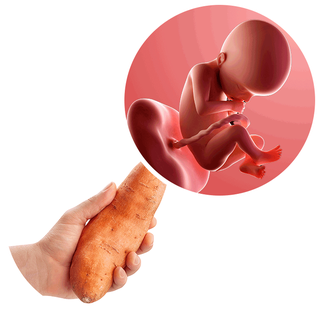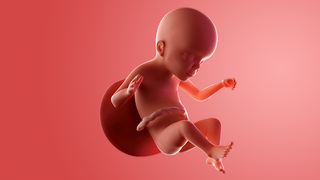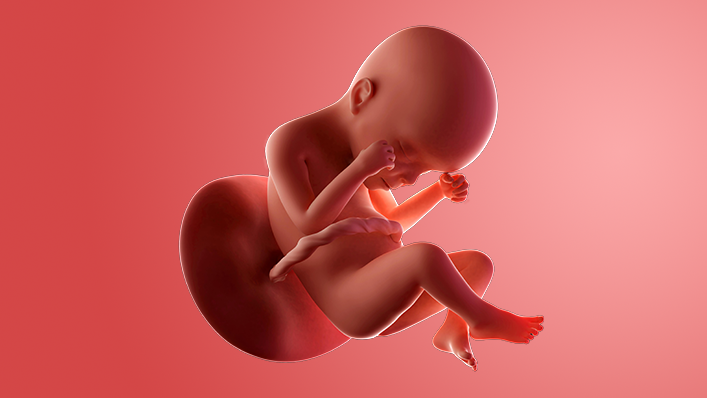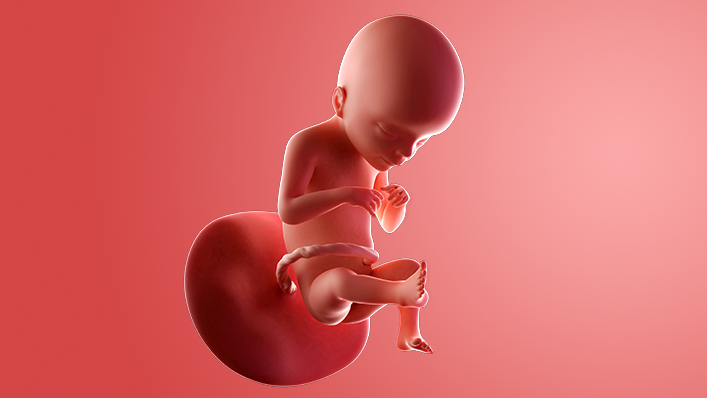- Week 13
- Week 14
- Week 15
- Week 16
- Week 17
- Week 18
- Week 19
- Week 20
- Week 21
- Week 22
- Week 23
- Week 24
- Week 25
- Week 26
- Week 27
Week 22
This is a good week to talk to your bump, sing to it, caress it with moisturiser and you might even feel a little flutter in response. It's all part of bonding with your unborn baby who, as you can probably tell, is getting bigger by the day.
What's happening in my body?
You may start noticing stretch marks appearing on your skin. Stretch marks are common in pregnancy.
They look like lines or streaks on your skin, and usually appear on your tummy, upper thighs or breasts.
Stretch marks are harmless and usually fade after the birth.
Read more about what causes stretch marks on the NHS website.
Whooping cough vaccination
Have you had the whooping cough vaccine? It's usually offered to pregnant women at around week 20 but you can have it from week 16 to week 32.
Whooping cough is on the rise – but you can protect your baby from this dangerous condition by having a vaccination. If you have not had it yet, speak to your midwife or a GP.
Read more about whooping cough vaccination in pregnancy on NHS.UK.
Get help to quit smoking
Cigarettes starve your baby of oxygen and increases the risk of miscarriage, stillbirth and cot death. You're at a crucial stage now, as your baby's lungs are developing.
Talk to your doctor or midwife about your local NHS Stop Smoking Services or call the NHS Smokefree helpline (9am to 8pm Monday to Friday, and 11am to 4pm Saturday and Sunday) on 0300 123 1044.
Piles in pregnancy
Piles (haemorrhoids) are swellings inside or around your bottom. Symptoms can include itching or soreness around your anus, and it can be painful when passing a stool (poo).
2nd trimester pregnancy symptoms (at 22 weeks)
Aches and pains are common in pregnancy, but sometimes it's hard to know what's serious. If you have any concerns, talk to your midwife or doctor, or call NHS 111.
If you are in severe pain, or bleeding from your vagina, call your midwife or GP immediately.
This week, your signs of pregnancy could include:
- tiredness and sleeping problems (week 19 has information about feeling tired)
- stretch marks (read about stretch marks on week 17's page)
- swollen and bleeding gums (week 13 has information about gum health during pregnancy)
- pains on the side of your baby bump, caused by your expanding womb ("round ligament pains")
- piles (read about piles on week 22's page)
- headaches (read about headaches in pregnancy on NHS.uk)
- backache
- nosebleeds
- indigestion and heartburn (week 25 talks about digestive problems)
- bloating and constipation (read about bloating on week 10's page)
- leg cramps (week 20 explains how to deal with cramp)
- feeling hot
- dizziness
- swollen hands and feet
- urine infections
- vaginal infections (see week 15 for vaginal health)
- darkened skin on your face or brown patches – this is known as chloasma or the "mask of pregnancy"
- greasier, spotty skin
- thicker and shinier hair
You may also experience symptoms from earlier weeks, such as:
- mood swings (week 8's page has information on mood swings)
- morning sickness (read about dealing with morning sickness on week 6's page)
- weird pregnancy cravings (read about pregnancy cravings on week 5's page)
- sore or leaky breasts (read about breast pain on week 14's page)
- a white milky pregnancy discharge from your vagina and light spotting (seek medical advice for any bleeding)
What does my baby look like?
Your baby, or foetus, is around 27.8cm long from head to toe. That's approximately the size of a sweet potato.
The lungs are developing and your little one will be doing some breathing practice in your womb.
Your baby is now swallowing small amounts of the amniotic fluid. This will usually stay in the bowels and then come out after the birth as a dark, sticky poo (meconium).
Your baby's taste buds are developing and could be influenced by what you eat. Try to eat healthily and include lots of fresh fruit and veg.

Action stations
How are you feeling? It's important that you prioritise your wellbeing (mentally as well as physically) during pregnancy.
Tommy's has lots of tips to help you relax. You can also create a pregnancy and post-birth wellbeing plan to help look after yourself and be prepared for when your baby arrives.
This week you could also…
More in week-by-week

Week 23
Around this time, your baby is practising breathing, and getting into patterns of sleeping and waking.
More in week-by-week guide to pregnancy


